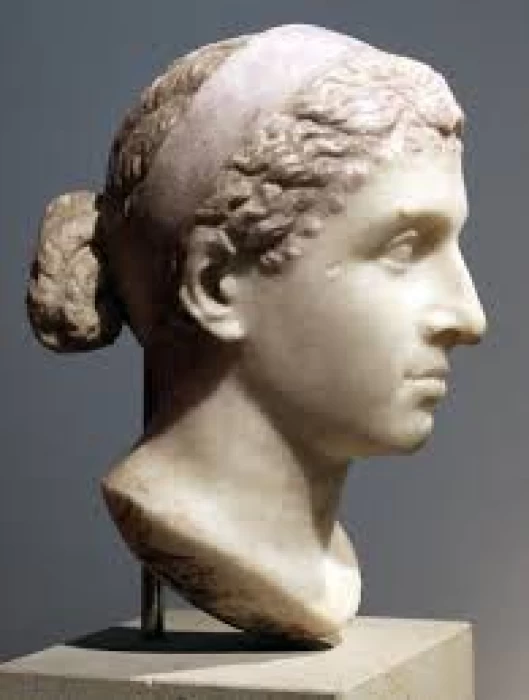
Queen Cleopatra and the Macedonian dynasty
Queen Cleopatra VII (died 30 BC), was one of the most famous queens of the ancient world ever, and one of the most famous queens of Egypt throughout its long history. She witnessed one of the most significant eras in the history of Egypt. According to many historians, they consider her the last Queen of the Ptolemaic era, and after the end of her rule, Egypt entered the beginning of a new era with the entry of the Romans into Egypt.
According to the book "Cleopatra", the beginning of Queen Cleopatra VII's rule was when her father Ptolemy XII gave her the title of love for her father, which led to the continuation of the title used by her father. Secondly: it linked her to him as his legitimate heir, before she officially reached the ruler in 51 BC. Ptolemy XII died, leaving Egypt to Cleopatra VII and his eldest son Ptolemy XIII. Many great rulers for Egypt influenced the country and its people, when you visit Egypt with Cairo Top Tours, you will be accompanied by a professional Egyptologist during Egypt Easter Tours. They will unveil the secrets of the Egyptian kingdom to you.
Besides, it was recently said that Cleopatra may have ruled alone for the first year after her father's death. There is a belief that no official marriage ceremony was held between Ptolemy XIII and his sister and that the two ruled together only. The book explains that Cleopatra's name at the beginning of her rule came after her brother's name, indicating that he was the dominant ruler, at the same time Ptolemy XIII had obtained three new guardians; Photinus, Achilles, and one of his teachers, Theodotus of Chios, were the group who in turn planned to remove Cleopatra from power, which was achieved in 49 BC when Ptolemy XIII was declared the sole ruler of Egypt.
But it seems that this matter did not last long after the intervention of Caesar of Rome. After Caesar visits Alexandria, and in his capacity as supervisor of the implementation of the will of Ptolemy XII, their father, he demands that they disband their forces and settle the differences by presenting them to him and issuing his ruling on them instead of settling them using force. This matter also did not last long with the death of Ptolemy XIII and Cleopatra returning to control the throne but with her younger brother Ptolemy XIV.
It is believed that Cleopatra committed suicide after her partner’s death by a Copra snake. Despite knowing about her suicide, her grave is not discovered yet. It is believed to be in Alexandria, but its location had been changed after the earthquakes. Cleopatra was glorified by Egyptian people and till now, they still call many locations with her name. you can discover one of these places like Cleopatra Spring in Siwa during one of the Egypt Desert Safari Tours where you can swim in the natural warm water in the middle of the desert.
Cleopatra, the daughter of Ptolemy XII Auletes, also known as Cleopatra Philopator, was the final acting ruler of Egypt’s extinguishing Ptolemaic dynasty. (69 BCE) was an heir to the Ptolemaic Macedonian-Greek dynasty, which traced its lineage back to Ptolemy I Soter, a general of Alexander the Great. She is renowned as one of the most beautiful women in history, a poet, writer, and others. She is also known for seducing two of Rome’s most famous people, Julius Caesar and Mark Antony, and thus making a political impact on Rome. Her interesting life and the time of her reign have fascinated historians, artists, and authors from ancient times to today, making her one of the most iconic figures of the ancient world.
Cleopatra was the daughter of Ptolemy XII Auletes of Egypt. Who her mother is remains unknown, including whether or not she was a member of the Ptolemaic dynasty. Cleopatra was a well-educated and fluent speaker of many languages including Greek, Egyptian, and the ones mentioned above as well. On the contrary, other queens were trying to adjust to the culture of the Greek and were ruling with the Egytian’s structure of their kingdoms.
In 51 BCE, Cleopatra was named,, together with her younger brother andhusband,d Ptolemy XIII, as co-ruler of Egypt, following the Ptolemaic practice of sibling marriage. But their relationship could not go without struggles, which ultimately resulted in a rebellion. In her pursuit of the throne, she came across Julius Caesar, who had just entered Egypt in 48 BCE during the pursuit of Pompey the Great. Cleopatra is famous for smuggling herself into Caesar’s presence rolled up on a carpet, an event that has reached mythical status by now.
Cleopatra's collaboration with Julius Caesar was both personal and political. With assistance provided by Caesar, she was able to restore her throne and held the position of co-regent with her younger brother, Ptolemy XIV. A child, Ptolemy XV Caesar, with whom Cleopatra and Caesar were linked.
After the death of Julius Caesar in 44 BCE, Cleopatra came back to Egypt, and among the turmoil of the Roman Republic, she tried to entrench her authority. In 41 BCE, she got engaged with Mark Antony, one of Rome’s triumvirates, both romantically and politically. Their relationship was controversial and in the military perspective, it was a good strategy because it was intended to join the forces of Egypt and Rome against the mutual enemy.














